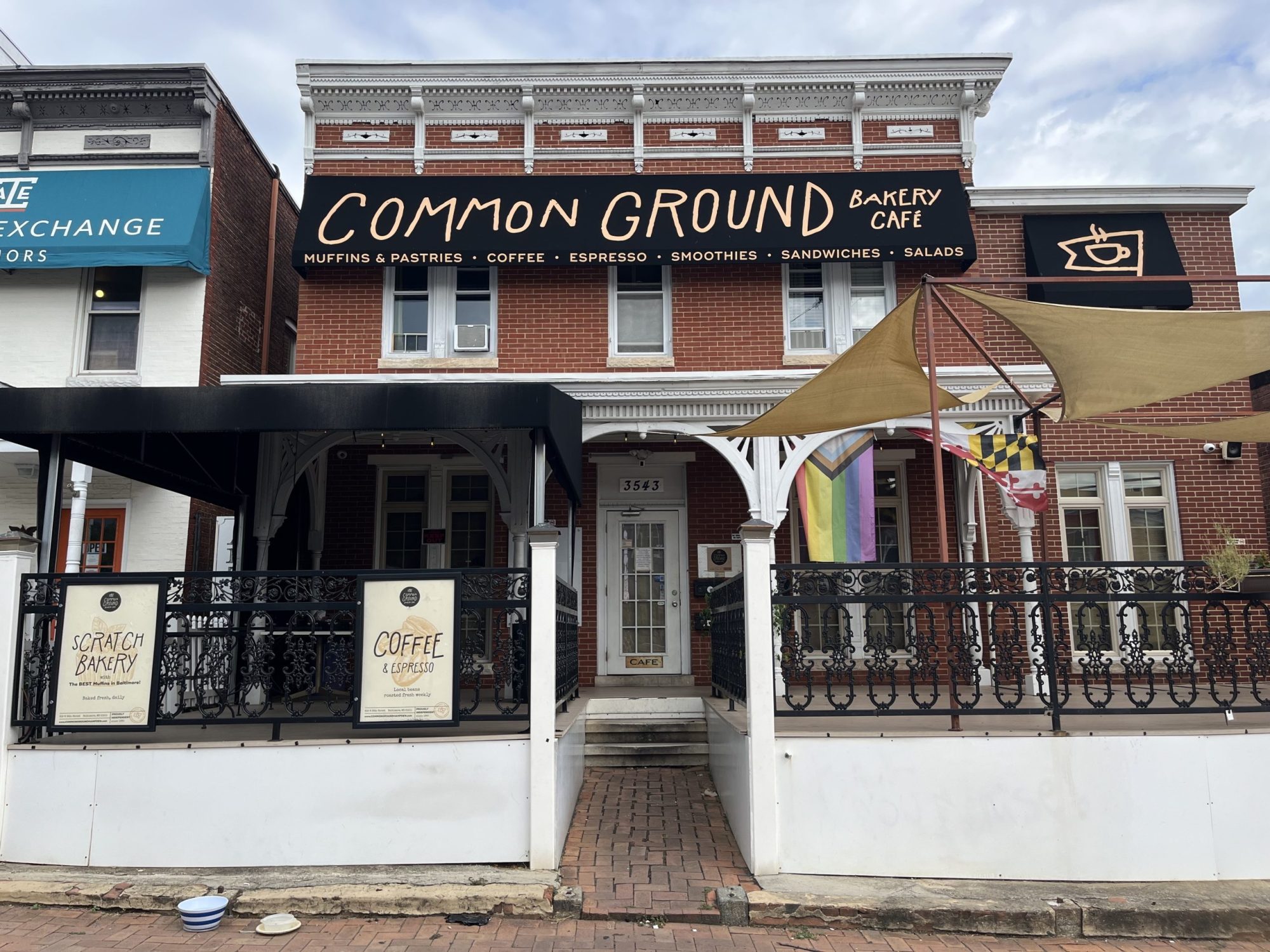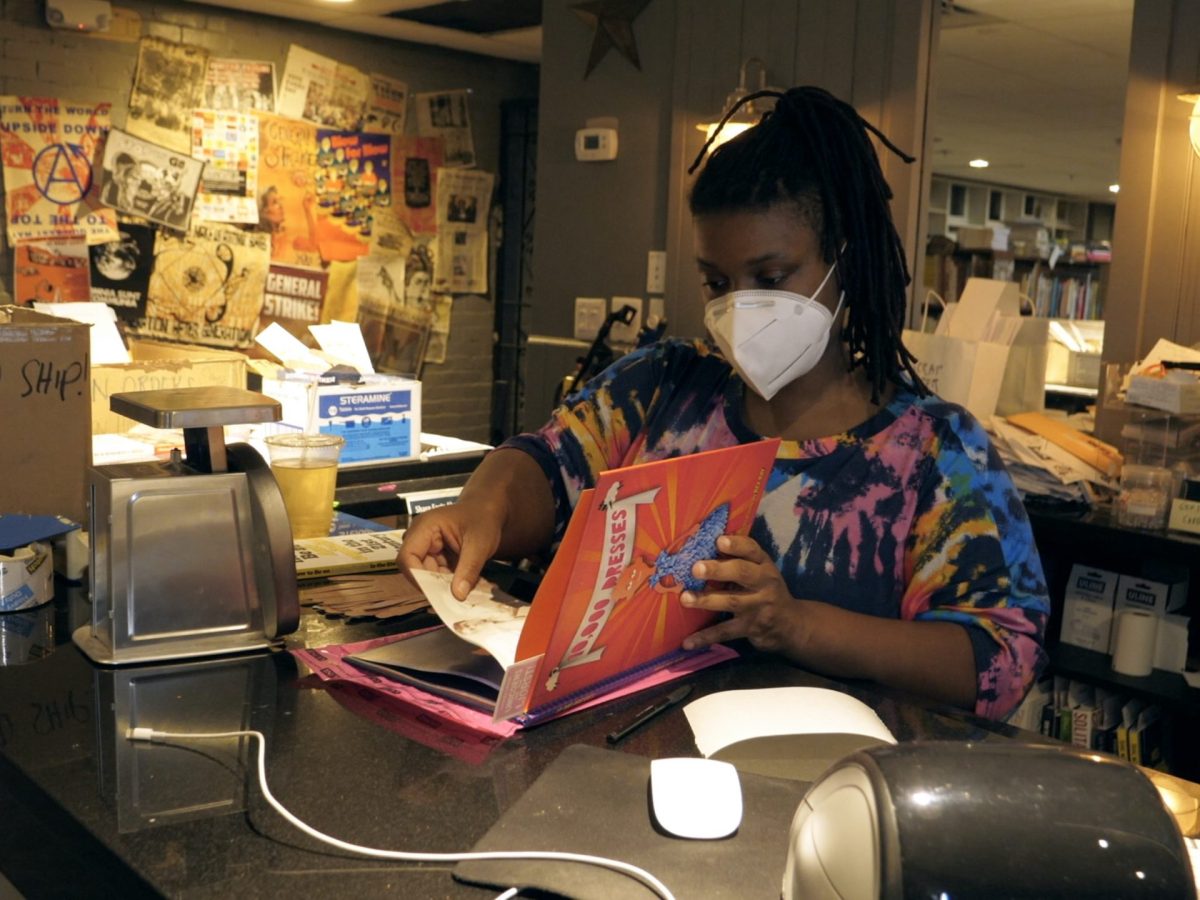Jake Urtes and Jonah Gallagher were getting ready to play a show in Brooklyn when they found out they had lost their jobs. The pair had taken the week off work for a short tour with their band, Shift Meal. To everyone’s surprise, their boss and owner of Common Ground Bakery Cafe, a long-established and beloved coffee shop in Baltimore’s Hampden neighborhood, had abruptly shut down the shop.
On the Common Ground internal Slack channel, workers read owner Michael Krupp’s brief message to all staff informing them that they wouldn’t need to come to work the next day, Monday, July 3. “For multiple reasons, today I have made the very difficult decision to cease operations,” Krupp wrote, in part. Managers had only learned about the closure a few minutes before staff, and the public found out on Monday morning, thanks to a sign taped to the store’s window.
On the Common Ground internal Slack channel, workers read owner Michael Krupp’s brief message to all staff informing them that they wouldn’t need to come to work the next day, Monday, July 3. “For multiple reasons, today I have made the very difficult decision to cease operations.”
“It didn’t really feel real,” Urtes told TRNN. “All of our hard work just up in flames in a second with no warning at all.”
More than 30 people lost their jobs when the store abruptly closed. Multiple workers told TRNN that, although they didn’t have exact figures, they understood Common Ground to be a profitable business. It was a neighborhood mainstay, too, having been in business for about 25 years. Krupp, a real estate investor, had owned it since 2011. He did not publicly explain why he closed the business and did not respond to TRNN’s requests for comment.
The day the cafe closed, a group of former staff created an Instagram, @CommonGroundWorkers, and shared a group photo with a caption detailing workers’ reactions to the news. The Instagram post also provided more information surrounding the shocking closure—including that some staff members had been working on a union campaign months before Krupp announced he was shutting down the store. The post struck a mournful tone, but it also showed there was already forward momentum, noting that workers discussed relaunching Common Ground as a worker-owned cooperative.
The Instagram post also provided more information surrounding the shocking closure—including that some staff members had been working on a union campaign months before Krupp announced he was shutting down the store.
A few months and many meetings later, they did just that, announcing today that Common Ground will soon reopen, in the same building, as a co-op. The date hasn’t been set yet, but they’re aiming to return in early September with a similar menu. Nineteen people will be worker-owners, and another three will return temporarily.
“We’ve always had ownership and pride in our work, and it feels so good to actually have literal ownership of our work,” Urtes said.
Shortly after the unexpected closure, former Common Ground staff met with the Baltimore Roundtable for Economic Democracy (BRED), a local branch of the national “community wealth cooperative” Seed Commons, which helps businesses convert to cooperative models. Seed Commons, with BRED as the local agent, is acquiring Common Ground and reopening it as a cooperative in partnership with the workers.
Kate Khatib, a director of Seed Commons and BRED, said the cafe already had a lot going for it as a potential co-op in terms of its scale, number of staff, and longevity in the neighborhood.
“Food service is a hard industry,” Khatib said. “And relationships aren’t always as strong as the ones that we’ve seen [at Common Ground]. And I think that has allowed the workers who are going to be returning to really start stepping into the roles and responsibilities of ownership.”
Re-forming as a co-op felt like “the most logical thing to do,” said Nic Koski, who’d been working there for nearly a year when it closed. “There are multiple folks essentially doing managerial tasks on a day-to-day basis. We’re running the shop all together.”
“We’ve always had ownership and pride in our work, and it feels so good to actually have literal ownership of our work”
Jake Urtes, Common GROUND WORKER-OWNER
Jackie Du, another former employee turned worker-owner, described Common Ground as a “special little bubble”—not only for patrons, but especially for the people working there. Du credits her coworkers for creating the homey, friendly, cool-but-unpretentious atmosphere for which the shop became known. When it closed down, Du went straight into “crisis mode,” pulling out her list of phone numbers. “I just sent out a mass text like, ‘Hey, we’re gonna meet at this time tomorrow to talk about things, get unemployment, and discuss our next steps.’”
Staff designated one worker’s Venmo account as a hardship fund, which has helped keep several of them afloat over the last few months.
Re-forming as a co-op felt like “the most logical thing to do,” said Nic Koski, who’d been working there for nearly a year when it closed. “There are multiple folks essentially doing managerial tasks on a day-to-day basis. We’re running the shop all together.”
This shift to a cooperative structure requires a deeper level of commitment from workers in an industry known for its high turnover rate. “I think, also, part of the idea behind turning a cafe into a co-op is changing the narrative when it comes to the service industry—that this is a temporary gig for people in their early 20s, before they get a real job,” Urtes said. “But this society needs people in those roles … and those people are doing a real job. It shouldn’t be seen as something that’s just a stepping stone to something else.”
Restructuring as a co-op has saved other Baltimore businesses, too, including the pizzeria Joe Squared and Taharka Brothers Ice Cream, both of which received capital from BRED to make their transition. The cooperative model of workplace democracy and collective decision-making also creates more sustainability and predictability for workers. A 2021 report from the Democracy at Work Institute (DAWI) and the US Federation of Worker Cooperatives (USFWC) comparing revenue and labor hours showed that, although revenue generated by cooperatively run businesses dropped 44% from FY 2018 to FY 2020, workers’ average hours dropped just 9% in that time.
More on WORKER COOPERATIVES IN BALTIMORE
Co-ops also tend to have fewer problems with losing workers so easily. Khatib estimates that, of the service-industry cooperatives Seed Commons has worked with around the United States, turnover rates there have been 20–30% lower than the industry average. If low-paid work and bad, exploitative, and even unsafe conditions promote higher turnover, then cooperatives, Khatib said, “can mitigate those things by giving people control over their working environments.”
“I’ve never seen anything like this. I started this whole thing feeling really depressed. As soon as I started talking to my friends and coworkers, they all really inspired me to just help them keep pushing and get this momentum going.”
Jonah Gallagher, COMMON GROUND WORKER-OWNER
Community support has been essential for the worker-owners, and they hope to see the support continue. They’re also just excited to get back into the shop.
“I’ve never seen anything like this,” said Gallagher, a barista. “I started this whole thing feeling really depressed. As soon as I started talking to my friends and coworkers, they all really inspired me to just help them keep pushing and get this momentum going.”
Back in July, days after the shutdown, Shift Meal played a homecoming show at the Ottobar, which became another opportunity for Common Ground employees and friends to gather in support. Wearing aprons as shirts, Gallagher and Urtes played their hearts out while coworkers cheered, screamed, and sang along. Prefacing their song “Personhood,” Urtes shouted out his coworkers for assuming leadership roles that week, roles “that maybe other people would’ve passed them over for.” He continued, “The reason I’m saying this now is because the first couple lines of this song address it perfectly, but I wrote it before all that shit.” He strummed a few times and then sang: “I’m still broke / at least I’ve got my friends and I’ve got my folks.”
Editor’s Note: Kate Khatib, co-founder and co-director of Seed Commons, is the spouse of TRNN Executive Director John Duda.





